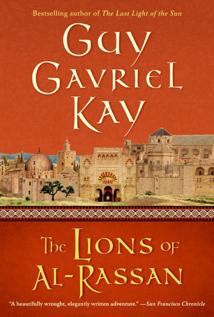
It was a day that would be remembered all her life by Jehane bet Ishak, the physician, for reasons over and above those of her fellow citizens in that proud, notoriously rebellious town: she lost her urine flask in the afternoon, and a part of her heart forever before the moons had set. The flask, for reasons of family history, was not a trivial matter.
That is a dense book.
You have a land in turmoil, warring city states, religious fervor, and the potential (perhaps a bit more than that) of a looming holy war.
Time and steady governance would bring Jad back into Al-Rassan, the king had declared, not burnings and destruction. Ibero wasn’t entirely sure how that meshed with holy doctrine, but he kept silent in the N presence of his betters.
You have a half dozen points of view, from a warrior poet to a general to a physician to a young boy and more.
I am increasingly unlikely to be best remembered, ibn Khairan decided ruefully, entering his home, for my poetry.
All tangled together in one glorious tangle of a plot.
It’s a lot for a single book and I think just crosses over my threshold for how much brain power I was looking to spend on a single book. It’s beautifully written, don’t get me wrong, and the absolute chaos at times certainly makes it feel all the more real. But on the flip side, it’s probably the most I’ve used X-Ray to look up who in the world a given character is (and have we actually even met them before) in a long time.
Speaking of ‘real life’, the blurb says:
Hauntingly evocative of medieval Spain, The Lions of Al-Rassan is both a brilliant adventure and a deeply compelling story of love, divided loyalties, and what happens to men and women when hardening beliefs begin to remake – or destroy – a world.
It’s not so much ‘hauntingly evocative’ as it is the real story of ~11th century Spain. I’ll admit to not being a scholar of the time period, but even to me, the parallels were clear. Instead of the Jews and Christians and Muslims, you have the Kindath and Jaddites and Asharites. They worship the moons/sun/stars, but the actual details barely matter in the story. Rodrigo is [[wiki:Rodrigo Díaz de Vivar]]. Ammar is Muhammad ibn Ammar (plus a bit). Etc.
It’s not a bad idea by itself. It’s a rich story, full of interesting characters. At the same time, it’s long enough ago that there is more than enough room to add your own twists and turns into the details. Plus, using real life twists and turns can make a story feel more ‘real’ itself. Even if real life tends to be just as unbelievable as any story at times.
In any case. I enjoyed it. Your milage may vary. It may be exactly what you’re looking for. And it was by far good enough that I’m going to have to seek out more Guy Gavriel Kay to see what else he’s written.
In fact, Ines suddenly realized, looking at the man on her couch, if he hadn’t been so much an infidel in the most important matters, she might have been able to name her husband a paragon among men.
Random side note:
“Mountain cats,” Husari said musingly at one point, “are said to be ferocious in their coupling.”
“Don’t tell me things like that!” Alvar groaned.
Reading this book and Jane Yellowrock at the same time made that line even funnier than it had any right to be.